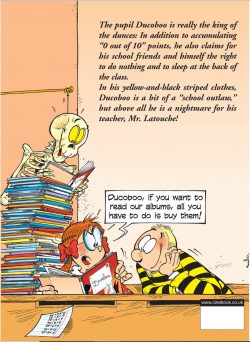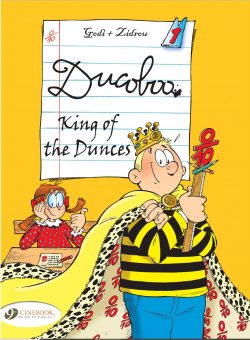

By Godi & Zidrou, coloured by Véronique Grobet & translated by Luke Spear (Cinebook)
ISBN: 978-1-905460-15-1 (Album PB/Digital edition)
School stories and strips of every tone about juvenile fools, devils and rebels are a lynchpin of modern western entertainment and an even larger staple of Japanese comics – where the scenario has spawned its own wild and vibrant subgenres. However, would Dennis the Menace (ours and theirs), Komi Can’t Communicate, Winker Watson, Don’t Toy with Me, Miss Nagatoro, Power Pack, Cédric or any of the rest be improved or just different if they were created by former teachers rather than ex-kids or current parents?
It’s no surprise the form is so evergreen: school life takes up a huge amount of children’s attention no matter how impoverished or privileged they are, and their fictions will naturally address their issues and interests. It’s fascinating to see just how much school stories revolve around humour, but always with huge helpings of drama, terror romance and an occasional dash of action…
One of the most popular European strips employing the eternal basic themes and methodology began in the last fraction of the 20th century, courtesy of scripter Zidrou (Benoît Drousie) and illustrator Godi.
Drousie is Belgian, born in 1962 and for six years a school teacher prior to changing careers in 1990 to write comics like those he probably used to confiscate in class. Other mainstream successes in a range of genres include Petit Dagobert, Scott Zombi, La Ribambelle, Le Montreur d’histoires, African Trilogy, Shi, Léonardo, a revival of Ric Hochet, and many more. However, his most celebrated and beloved stories are the Les Beaux Étés sequence (digitally available in English as Glorious Summers) and 2010’s Lydie, both illustrated by Spanish artist Jordi Lafebre.
Zidrou began his comics career with what he knew best: stories about and for kids, including Crannibales, Tamara, Margot et Oscar Pluche and, most significantly, a feature about a (and please forgive the charged term) school dunce: L’Elève Ducobu…
Godi is a Belgian National Treasure, born Bernard Godisiabois in Etterbeek in December 1951. After studying Plastic Arts at the Institut Saint-Luc in Brussels he became an assistant to comics legend Eddy Paape in 1970, working on the strip Tommy Banco for Le Journal de Tintin whilst freelancing as an illustrator for numerous comics and magazines. He became a Tintin regular three years later, primarily limning C. Blareau’s Comte Lombardi, but also working on gag strip Red Rétro by Vicq, with whom he also produced Cap’tain Anblus McManus and Le Triangle des Bermudes for Le Journal de Spirou in the early 1980s. He soloed on Diogène Terrier (1981-1983) for Casterman.
He then moved into advertising cartoons and television, cocreating with Nic Broca the animated TV series Ovide. He only returned to comics in 1991, collaborating with newcomer Zidrou on L’Elève Ducobu for magazine Tremplin. The strip launched in September 1992 before transferring to Le Journal de Mickey, and collected albums began in 1997 – 25 so far in French and Dutch, 8 for Turkish readers, and 6 for Indonesia.
When not immortalising modern school days for future generations, Godi latterly diversified, co-creating (1995 with Zidrou) comedy feature Suivez le Guide and game page Démon du Jeu with scripter Janssens.
The series has spawned a live action movie franchise, a dozen pocket books plus all the usual attendant merchandise paraphernalia. and we English-speakers’ introduction to the series (5 volumes thus far) came courtesy of Cinebook with 2006’s initial release King of the Dunces which was in fact the 5th European collection L’élève Ducobu – Le roi des cancres.
The format is loads of short – most often single page – gag strips starring a revolving cast who are all well established by this point, but also fairly one-sided and easy to get a handle on.
Our star is a well-meaning, good natured young oaf who doesn’t get on with school. He’s sharp, inventive, imaginative, inquisitive, personable and just not academical at all. We might today put him on a spectrum or diagnose a disorder like ADHD, but at heart he’s just not interested and has better things to do…
Dad is a civil servant and Mum left home when Ducoboo was a baby, but then there’s a lot of that about. Leonie Gratin – from whom he constantly copies answers – only has a mum.
The boy and his class colleagues attend Saint Potache School and are mostly taught by draconian Mr Latouche who’s something of humourless martinet. Thanks to him, Ducoboo has spent so much time in the corner with a dunce cap on his head that he’s struck up a friendship with the biology skeleton. He calls himself Neness and is always ready with a theory or suggestion for fun and frolics…
In this volume, after being caught cheating again, Latouche applies what he calls “truth serum” to the squabbling kids. The wild kid fakes taking it, but Leonie is an obedient child and soon can’t help blurting out her hidden feelings for the class outlaw – thereby ensuring he voluntarily tries keeping his distance for some time after …or at least until the next test or exercise…
On view are fresh riffs on being late and missing class; roll calls and registers; new and old class furniture; novel ways to copy answers; writing lines and how to hack the system; the power of art; collecting educational stickers; yawning in class; grammar and grandmas, punctuation, warring student radio stations; the restorative blessings of short naps whilst working; the ultimate futility of bad boys actually working and still being called a cheat and always, always cheating, copying and guessing answers…
Also encountered are jaunts to a circus, educational psychologists, Teachers’ changing pay and conditions, new ways to learn, the origins of his skeletal comrade, Nativity plays and mistletoe mischief, classical poetry – like ‘The Nitwit and the Trickster’ by bony scribe Nessy de la Fontanelle, dress codes for kids from other cultures (especially fascinating new girl Fatima and her lovely chador), new romantic fancies and classroom exoticism, outrageous example test papers and – as a main event – the educational crucible of April Fool’s Day and its cumulative effect on Latouche…
Wry, witty and whimsical whilst rehashing evergreen childhood themes, Ducuboo is an up-tempo, upbeat addition to the genre that any parent or pupil can appreciate and enjoy. If your kids aren’t back at school quite yet, why not keep them occupied a little longer with the King of the Dunces – whilst thanking your lucky stars that he’s not yours?
© Les Editions du Lombard (Dargaud- Lombard) 2000 by Godi & Zidrou. English translation © 2006 Cinebook Ltd.
